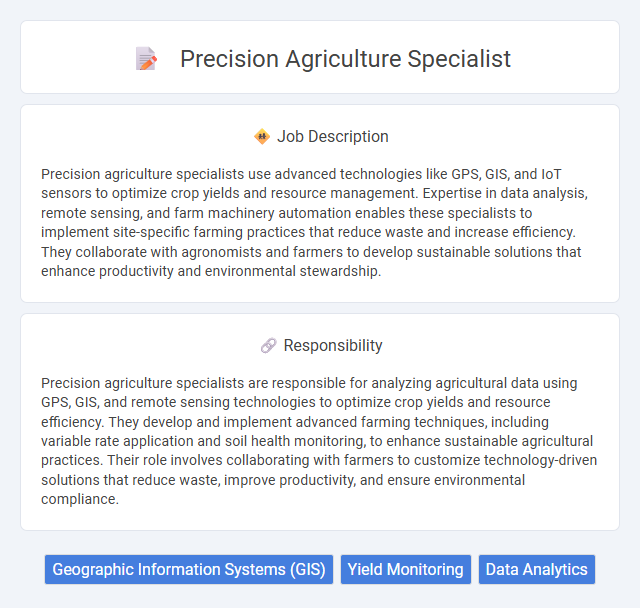
Precision agriculture specialists use advanced technologies like GPS, GIS, and IoT sensors to optimize crop yields and resource management. Expertise in data analysis, remote sensing, and farm machinery automation enables these specialists to implement site-specific farming practices that reduce waste and increase efficiency. They collaborate with agronomists and farmers to develop sustainable solutions that enhance productivity and environmental stewardship.
Individuals with strong analytical skills and a keen interest in technology are likely suited for a precision agriculture specialist role, as the job involves interpreting data and applying smart farming techniques. Those comfortable working outdoors and adapting to evolving agricultural technologies might find this career highly rewarding. Candidates lacking a passion for both agriculture and data-driven solutions may find the position less fitting for their strengths and interests.
Qualification
A Precision Agriculture Specialist typically requires a degree in agricultural engineering, agronomy, or a related field, combined with expertise in GPS technology, GIS mapping, and data analytics. Proficiency in drone operation, remote sensing, and precision farming software is essential for optimizing crop yields and resource management. Strong analytical skills and experience with IoT devices and variable rate technology enhance their ability to implement sustainable farming solutions.
Responsibility
Precision agriculture specialists are responsible for analyzing agricultural data using GPS, GIS, and remote sensing technologies to optimize crop yields and resource efficiency. They develop and implement advanced farming techniques, including variable rate application and soil health monitoring, to enhance sustainable agricultural practices. Their role involves collaborating with farmers to customize technology-driven solutions that reduce waste, improve productivity, and ensure environmental compliance.
Benefit
Precision agriculture specialists likely enhance crop yields and resource efficiency by utilizing advanced technologies such as GPS, drones, and data analytics. Their expertise probably leads to reduced environmental impact through optimized use of water, fertilizers, and pesticides. Companies may benefit from increased profitability and sustainable farming practices by employing these specialists.
Challenge
Precision agriculture specialists likely face challenges related to integrating advanced technologies with traditional farming methods, which may require continuous adaptation to rapidly evolving tools such as GPS, drones, and data analytics. They probably encounter difficulties in managing large datasets to optimize crop yields while minimizing environmental impact, demanding strong analytical and technical skills. The probability of meeting resistance from farmers hesitant to adopt new technologies might be significant, necessitating effective communication and educational efforts.
Career Advancement
Precision agriculture specialists leverage advanced technologies such as GPS, IoT sensors, and data analytics to optimize crop yields and resource efficiency. Career advancement opportunities include roles like precision agriculture manager, agronomic consultant, or data scientist within agri-tech firms. Developing expertise in emerging tools such as drone technology and artificial intelligence enhances prospects for leadership positions in sustainable farming innovation.
Key Terms
Geographic Information Systems (GIS)
Precision agriculture specialists utilize Geographic Information Systems (GIS) to analyze spatial data for optimizing crop yield and resource management. They integrate GPS technology, remote sensing, and GIS software to create detailed maps that guide variable-rate applications and monitor soil health. Expertise in spatial analysis and data visualization enables precise decision-making, reducing costs and environmental impact in modern farming practices.
Yield Monitoring
Precision agriculture specialists utilize advanced technologies such as GPS, IoT sensors, and satellite imagery to optimize yield monitoring and enhance crop production efficiency. They analyze real-time data to identify variations in soil conditions, moisture levels, and crop health, enabling targeted interventions that maximize harvests. Expertise in yield mapping software and data interpretation plays a critical role in improving resource management and increasing agricultural profitability.
Data Analytics
A Precision Agriculture Specialist leverages advanced data analytics to optimize crop yields and resource efficiency by analyzing soil health, weather patterns, and crop health data using GIS and remote sensing technologies. Proficiency in machine learning algorithms and predictive modeling is essential for interpreting large datasets and making data-driven decisions to enhance farm management practices. Expertise in integrating IoT sensor data and drone imagery contributes to precision farming strategies that reduce waste and improve sustainability.
 kuljobs.com
kuljobs.com